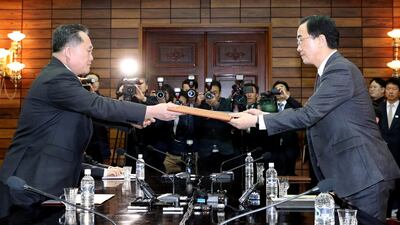North Korean leader Kim Jong-un will meet South Korean President Moon Jae-in at a border village on April 27, South Korea announced Thursday after the nations agreed on a rare summit that could prove significant in global efforts to resolve a decades-long standoff over the North's nuclear program.
The announcement was made after officials met at the border village of Panmunjom. The Koreas plan to hold another preparatory meeting on April 4 to discuss protocol, security and media coverage issues, according to a joint statement released by the countries.
The leaders of the two Koreas have held talks only twice since the 1950-53 Korean War, in 2000 and 2007, under previous liberal governments in Seoul. The Korean Peninsula was divided in 1945 into a US-dominated south and Soviet-backed north.
Seoul's Unification Minister, Cho Myoung-gyon, one of the three South Korean participants in Thursday's talks, said setting up discussions between the leaders on ways to rid the North of its nuclear weapons would be a critical point.
Mr Cho also said there was a "sufficient exchange of opinions" on the agendas of the summit, but fell short of specifying if the nuclear issue would be brought up.
"Both sides agreed to prepare for (the summit) in a way that would allow sincere and heartfelt discussions (between the leaders). If there's a need, we decided to continue discussions on the summit agendas through follow-up high level meetings in April," Mr Cho said.
"Both sides will continue working level discussions (on the agendas) while focusing on the issues surrounding the denuclearisation of the Korean Peninsula, the stabilization of peace and the development relations between the South and North."
When asked whether such issues would shape the discussions between Korea's two leaders, Mr Cho said "yes."
_______________
Read more:
Kim Jong-un open to discussing weapons programme: Chinese news agency
_______________
The North's three delegates were led by Ri Son Gwon, chairman of a state agency that deals with inter-Korean affairs. The countries earlier this month reached an agreement for a summit on the southern side of the border village. Thursday's meeting was held to determine the date and other issues.
Mr Ri after the meeting hailed the agreement over the summit he said provides "immense expectations and new hope for the entire nation that desires for peace on the Korean Peninsula." He called for officials from both countries to do their best to "perfectly secure the historic meeting between the leaders."
The countries also agreed to hold a separate meeting to discuss communication issues and maintain working-level discussions through document exchanges, according to the statement.
The South's delegation arrived in Panmunjom after their vehicles crossed the heavily guarded border near the southern city of Paju.
Greeting the South Korean officials at the North Korea-controlled Tongilgak building, Mr Ri said that the past 80 days have been filled with "unprecedented historic events" between the rivals, referring to the Koreas resuming dialogue before the Winter Olympics in the South and the agreement on the summit.
He expressed hopes for an outcome that would meet the "hope and desire of the nation."
Mr Cho, in response, said officials in the preparatory talks should do their best to set up a successful summit as the "current situation was created by decisions from the highest leaders of the North and South."
The talks follow a surprise meeting this week between Kim and Chinese President Xi Jinping, which appeared to be aimed at improving both countries' positions ahead of Kim's planned meetings with Moon and President Donald Trump.
In setting up separate talks with Beijing, Seoul, Washington, and potentially with Moscow and Tokyo, North Korea may be moving to disrupt any united front among its negotiating counterparts.
By reintroducing China, which is the North's only major ally, as a major player, North Korea also gains leverage against South Korea and the United States, analysts say.
In his talks with Xi, Kim may have discussed economic co-operation with China or requested a softening of enforcement of sanctions over the North's nuclear weapons and missiles. North Korea also wants Beijing to resist tougher sanctions if the talks with Washington and Seoul fall apart and the North starts testing missiles again.
Using a subsequent visit to the United States, Moon's envoys also brokered a potential meeting between Kim and Trump, who said he would meet the North Korean leader "by May."

